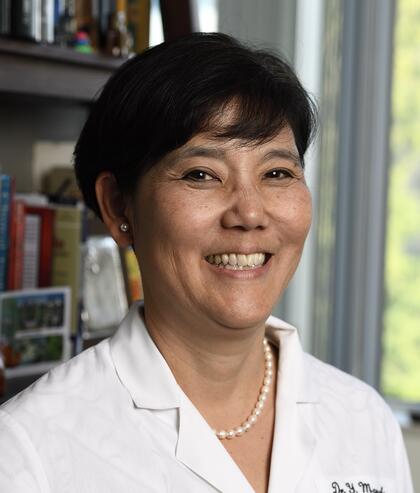This article was originally published by the Dome in its January/February 2025 issue.
If you've ever taken an at-home diagnostic test for COVID-19, you can partially credit the technology to the Johns Hopkins University Center for Innovative Diagnostics for Infectious Diseases (CIDID).
The center, funded largely by federal agencies such as the National Institutes of Health, the Centers for Disease Control and Prevention, and the Department of Defense, is dedicated to accelerating the development and review of rapid diagnostic tests that could be used worldwide for a wide range of infectious diseases, with an eye toward improving global public health.

Image caption: Yuka Manabe
Image credit: Will Kirk / Johns Hopkins University
In addition to developing tests for COVID-19, center staff have played a role in creating rapid diagnostic tests for gonorrhea, chlamydia, and syphilis, and participated in the clinical study for the first point-of-care diagnostic for molecular diagnosis of hepatitis C, approved by the Food and Drug Administration in June 2024.
Leading these efforts is physician Yuka Manabe, a professor of medicine in the Department of Medicine Division of Infectious Diseases, who is passionate about bringing tests to consumers worldwide. She works closely with the other core leads from infectious diseases including Susan Tuddenham (Needs Assessment and Dissemination Core), William Osburn (Technology Core), and Matthew Hamill (Clinical Core).
Manabe began her career in molecular biology research. When she graduated in 1991 from Columbia University College of Physicians and Surgeons in New York City, the majority of the internal medicine patients had HIV or AIDS, which was universally fatal at that time. Just after the rollout of antiretroviral therapy in Uganda in 2004, she had an opportunity to live in Uganda from 2007–2012; that experience "made it clear to me that there is not diagnostic certainty in very many parts of the world," she says. "You might have a patient who comes in with a fever, and you don't know what's wrong with them. I think I was meant to search for diagnostic certainty and targeted treatment that can save lives and prevent antimicrobial resistance."
After completing her residency in internal medicine at Johns Hopkins Hospital and her fellowship in infectious diseases at the School of Medicine, Manabe joined the faculty in 1999. She has joint appointments in the Johns Hopkins Bloomberg School of Public Health departments of International Health and Molecular Microbiology and Immunology and also serves as the director of global health research and innovation at the Johns Hopkins Center for Global Health.
She has been working on diagnostic discovery in the U.S. since 2012, focusing mainly on point-of-care technologies for sexually transmitted infections (STI) under Charlotte Gaydos, professor emerita of infectious diseases, and then establishing CIDID in 2019. During the COVID-19 pandemic, she and her colleagues were involved in the national effort to quickly bring to market rapid diagnostic tests for SARS-CoV-2. Now, they're helping companies retool or expand these testing platforms for other diseases.
"I feel so motivated to come to work every day, because all of those test platforms that have been developed can be pivoted to sexually transmitted infections [and other conditions]," Manabe says. And since the pandemic, when Americans learned how to use point-of-care diagnostic tests, the success of home-based testing and the expanded market for tests for other diseases falls uniquely within Manabe's field of expertise.
"Imagine you could test yourself the way you do for pregnancy to find out if you have gonorrhea, chlamydia, HIV, or syphilis. These are all going to be, hopefully, possible here in the U.S. and in resource-limited settings."
Not only does the center develop its own diagnostic tests—Manabe says one of its tuberculosis tests with high sensitivity costs less than $2—but it also consults with external companies and evaluates the tests they have developed.
CIDID staff members put a test through a process known as a tailored benchtop evaluation. With an STI test, for example, they'll take vaginal swab samples from studies and spike them with known quantities of an organism, gradually adding less and less to determine the test's detection limits. They'll perform inclusivity and exclusivity testing to make sure a test accurately finds the target organisms.
Then there are outlying issues to consider: What happens if someone puts a swab in upside down, or the power shuts off, or they don't add human material? In order to provide helpful feedback, CIDID team members scrutinize a potential test's usability and performance: Could an elderly person use a test dropper to squeeze liquid into a small hole? Are the instructions clear and legible?
Image caption: Lydia Garcia Jacinto processes specimens in Yuka Manabe’s diagnostics lab
Image credit: Will Kirk / Johns Hopkins University
The top considerations on its checklist are accuracy, cost, and speed: Studies have shown that most people are willing to wait only 20 to 30 minutes for a test result. It also has to be easy to use. Companies must show that untrained people are able to follow the self-testing instructions correctly. Additionally, all test materials must be nontoxic; environmentally friendly components are preferred.
Currently, the team is either working on or evaluating rapid diagnostics for conditions such as STIs, acute febrile illness, sepsis, respiratory infections, and tuberculosis. The center also funds companies to accelerate diagnostic development in these areas of interest, and it supports faculty test development efforts at Johns Hopkins.
"It's almost like a dating service," Manabe says. "We try to link up people who have technology that would apply to a disease that we know has a clinical need.
"We're agnostic to all of the diagnostic technologies we see. We want all of them to cross the finish line, because in a capitalist market, the more competition there is, the more the price goes down for the consumer. And that's good for everyone."
Posted in Health
Tagged public health, infectious disease







